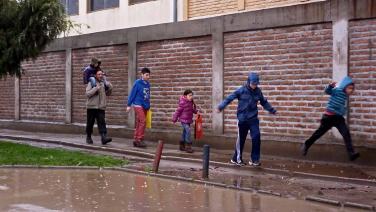
Como me da la gana II, Ignacio Agüero, Chile, 2016, 86m, DCP, Spanish
In 1986, in the midst of the Pinochet dictatorship, the Chilean director Ignacio Agüero filmed Como me da la gana, a documentary piece in which his fellow film makers and peers responded to the question “Why are you filming?”. Their responses became a declaration of principles and an act of political, ethical and cinematographic resistance for an entire generation of aspiring film makers during the dictatorship.
Thirty years later, now in an age of democracy and freedom, Ignacio Agüero returns to the streets and this time asks film makers about the trade itself: “What is cinematography to you?”. This sequel does not respond to an urgent political situation, but rather reflects on another sort of emergency: that of the very language of film. The movie looks at different notions of what cinema is today, in a time when Chilean audiovisual works have gained international renown (leading names include Pablo Larraín, Torres Leiva, Niles Atallah and the recent Oscar winner Sebastián Leilo).
The movie goes far beyond the concept of a documentary sequel, however. The truly fundamental aspect of this piece is the way in which Agüero uses such a basic and essential question to shape an essay on his own cinematographic biography. We are therefore witness to the memories of a director who is dedicated to the art of making films. The viewer experiences a series of archive images, fragments from the director's own films, dates, textures, beginnings and restarts, diverse materials, interviews, meetings and talks in the editing room, all of which show that there are film makers like Ignacio Agüero for whom life and work—the cinematographic and the living—are part of the same impulse.
Grand Prix at the Marseille Festival of Documentary Film.
This film is being screened in dialogue with Zerkalo (The Mirror) by Andréi Tarkovski, the self-portrait of the Russian director and his particular essay on the memory and the art of making cinema.
This film is being screened in dialogue with Zerkalo (The Mirror) by Andréi Tarkovski, the self-portrait of the Russian director and his particular essay on the memory and the art of making cinema.
